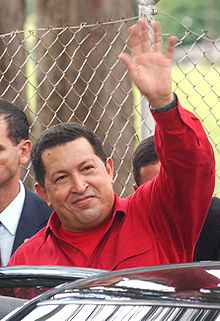<font size="5"><center>Venezuela's Chavez:
new coup plot discovered</font size></center>
Sep 11, 2008 03:22 PM
IAN JAMES
The Associated Press
CARACAS– President Hugo Chavez said his government has uncovered a plot to overthrow him and detained a group of alleged conspirators.
Chavez said Thursday that "various" suspects were detained, and accused them of trying to assassinate him with tacit backing from his political opponents and the United States.
A group of current and former military officers were recorded during tapped phone conversations discussing blowing up the presidential jet or bombing the presidential palace, Chavez said. He played some of the recordings during a televised speech.
"They're the same coup-plotters," said Chavez, who survived a failed 2002 coup. Without offering evidence, he said the suspected conspirators had support from "the political opposition ... the U.S. empire.''
U.S. officials have repeatedly denied Chavez's accusations that Washington has backed attempts to overthrow him.
While the leftist leader has regularly accused opponents of trying to oust him, he has not recently given such a detailed account of any purported plot.
Chavez ordered his defense minister to investigate the alleged plot involving an active vice admiral and other former military officers. He said his intelligence services had been "following this for some time.''
Chavez ally Mario Silva, who hosts a program on state television, first played recordings of the purported phone conversations late Wednesday. Silva said Vice Admiral Carlos Millan was among those accused, along with two other ex-officers from the National Guard and the air force.
In one recording aired, a voice identified as an ex-officer said ``we're going to take" the presidential palace.
Chavez said the conspirators have been "looking for ground-to-air missiles ... to try to blow up the presidential plane ... or bomb the (presidential) palace with a plane.''
Chavez accused private media organizations of trying to ``silence" news of the alleged coup attempt, and insisted he has evidence that an attempt to assassinate him "is being planned.''
http://www.thestar.com/News/World/article/497577
new coup plot discovered</font size></center>
Sep 11, 2008 03:22 PM
IAN JAMES
The Associated Press
CARACAS– President Hugo Chavez said his government has uncovered a plot to overthrow him and detained a group of alleged conspirators.
Chavez said Thursday that "various" suspects were detained, and accused them of trying to assassinate him with tacit backing from his political opponents and the United States.
A group of current and former military officers were recorded during tapped phone conversations discussing blowing up the presidential jet or bombing the presidential palace, Chavez said. He played some of the recordings during a televised speech.
"They're the same coup-plotters," said Chavez, who survived a failed 2002 coup. Without offering evidence, he said the suspected conspirators had support from "the political opposition ... the U.S. empire.''
U.S. officials have repeatedly denied Chavez's accusations that Washington has backed attempts to overthrow him.
While the leftist leader has regularly accused opponents of trying to oust him, he has not recently given such a detailed account of any purported plot.
Chavez ordered his defense minister to investigate the alleged plot involving an active vice admiral and other former military officers. He said his intelligence services had been "following this for some time.''
Chavez ally Mario Silva, who hosts a program on state television, first played recordings of the purported phone conversations late Wednesday. Silva said Vice Admiral Carlos Millan was among those accused, along with two other ex-officers from the National Guard and the air force.
In one recording aired, a voice identified as an ex-officer said ``we're going to take" the presidential palace.
Chavez said the conspirators have been "looking for ground-to-air missiles ... to try to blow up the presidential plane ... or bomb the (presidential) palace with a plane.''
Chavez accused private media organizations of trying to ``silence" news of the alleged coup attempt, and insisted he has evidence that an attempt to assassinate him "is being planned.''
http://www.thestar.com/News/World/article/497577


 and i'm sure they'll keep trying
and i'm sure they'll keep trying whats the difference ???
whats the difference ???






